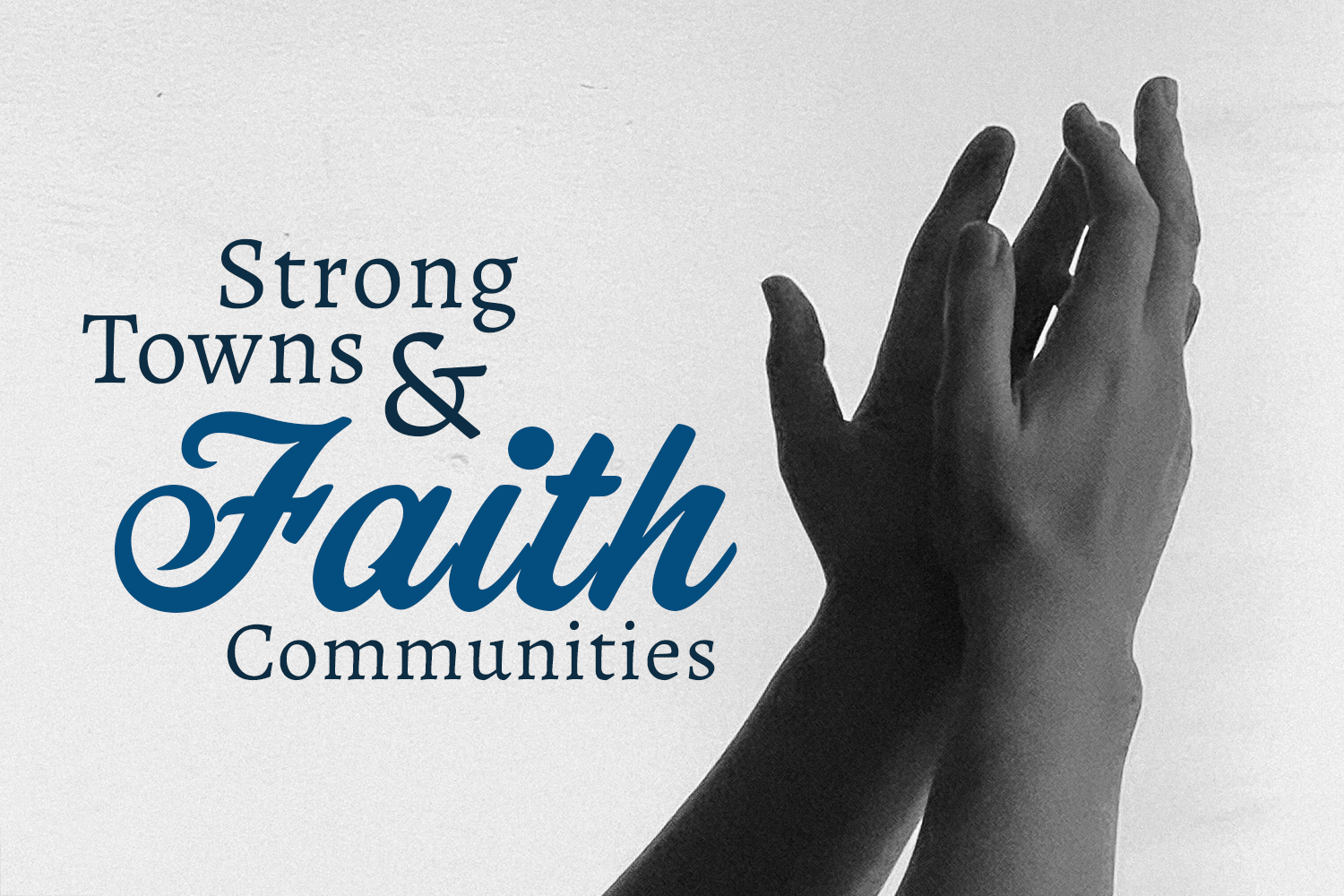Strong Towns + Faith Communities: Announcing a New Series
(Source: Unsplash, with edits.)
The Strong Towns journey is a hallway with many doors. There are any number of entry points into the Strong Towns conversation. For some it is municipal finances or urban design, for others housing, bike advocacy, economic development, the environment, land use, etc. The convergence of these diverse passions contributes to the movement’s dynamism.
My own path to Strong Towns was, believe it or not, an outworking of my faith journey.
I’m a Quaker Christian. My wife, Kate, and I have long felt called to live out our faith within the context of our specific neighborhood. In time, we got involved with an organization called the Parish Collective, where we discovered hundreds of other place-minded faith expressions from around the world. I also co-wrote a book called Slow Church, which explores how churches are rooting themselves in the pace and place of their particular neighborhoods. In the four years after that book’s release I visited more than 100 neighborhoods around the United States and Canada. On those journeys I met people of faith who were weaving a fabric of care in their places, starting and supporting small businesses, standing up for neighbors in danger of being displaced, creating affordable housing, facilitating reconciliation, and much, much more.
Kate and I had started thinking more about the built environment, too. I’ve written about this before, so I won’t go into detail here, but we began asking ourselves previously unimaginable questions. For example:
Does God care how wide this road is?
Does God have a preference for how tight the turning radius is at this intersection?
Will this much-hyped urban highway project get the community closer to God’s vision for shalom (peace)—or further away?
I discovered Strong Towns in 2014 while looking for answers. This wasn’t a theoretical exercise. The questions were at once theological and imminently practical: Strong Towns helped us understand that the way we build our cities can either bring people together or keep them apart; promote human flourishing, and the flourishing of nature, or diminish it. What’s more, Strong Towns provided an approach to addressing these issues that kept at the center the people whose lives are most affected by them: the bottom-up revolution.
Since coming on staff in August 2019, I have met a number of people whose Strong Towns journeys resemble my own. They come from all walks of life. They include professional clergy as well as laypeople. They are engineers and planners and city councilors, as well as concerned citizens. They also come from a variety of religious traditions.
What we have in common is the conviction that people of faith—and faith communities in particular (churches, synagogues, mosques, etc.)—have an indispensable role in building stronger, more resilient, more just, and better-connected cities. I’ll go as far as to say that it is my personal belief that faith communities represent the “sleeping giant” of the Strong Towns movement. There are an estimated 350,000 religious congregations in the United States and about 30,000 in Canada. If we can plug congregations into the Strong Towns movement, and connect Strong Towns advocates with community-minded congregations, there is so much we could accomplish together.
Over the next two months, we will publish a series of articles and podcasts on how faith communities are involved in the work of building stronger, more resilient cities. The goal is twofold:
To inspire religious congregations to get involved in the work of building strong towns.
To inspire Strong Towns advocates to enfold faith communities into their works in progress.
The series will highlight the work of faith communities from various religious traditions. Much of this content is already prepared or in the process of being prepared. But we also want to hear from you, our members and readers: Do you know of a faith-based group in your neighborhood doing work resonant with the Strong Towns approach, and whose story deserves to be told? If so, I’d love it if you’d send me an email at john@strongtowns.org. I want to hear all about it.
We’ve also set up a new landing page that curates past and future articles on this topic. We will continue to update this page throughout the series and beyond. We’re excited about this series, and we hope you are too!


John Pattison is the Community Builder for Strong Towns. In this role, he works with advocates in hundreds of communities as they start and lead local Strong Towns groups called Local Conversations. John is the author of two books, most recently Slow Church (IVP), which takes inspiration from Slow Food and the other Slow movements to help faith communities reimagine how they live life together in the neighborhood. He also co-hosts The Membership, a podcast inspired by the life and work of Wendell Berry, the Kentucky farmer, writer, and activist. John and his family live in Silverton, Oregon. You can connect with him on Twitter at @johnepattison.
Want to start a Local Conversation, or implement the Strong Towns approach in your community? Email John.